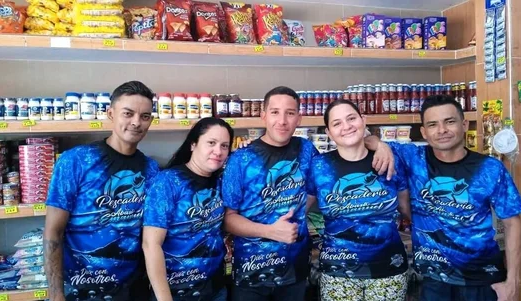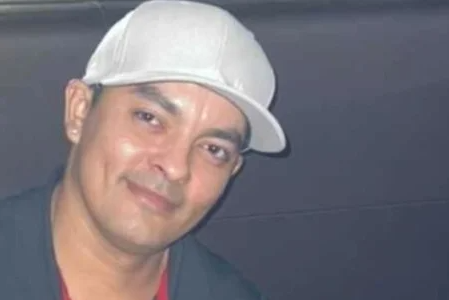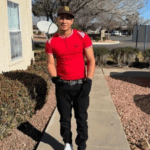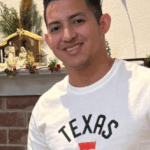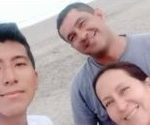In December 2024, Luis was detained during a traffic stop after police saw his tattoos, despite having legal documentation. He was held in ICE custody and denied the chance to present evidence about his tattoos in court. On March 14, 2025, he told his wife, Orianny, that he was being deported to Venezuela. Days later, she recognized him in videos of detainees sent to El Salvador’s CECOT prison, and his name later appeared on a leaked list of deportees.
Luis was never formally charged or given a fair legal process. Orianny has had no contact with him since and is left fighting for his release, living with anxiety and uncertainty about his fate.
Sources: Human Rights Watch, Cristosal
Luis Alfredo Núñez Falcón, 38, was born in Portuguesa state of Venezuela, but lived in Puerto Cabello (Carabobo state, Venezuela) since he was 18. Luis and is sister were raised by their grandmother who died in the pandemic.
Luis was a fisherman in Venezuela; he fished and then sold the fish at a little store. He met his wife , Orianny Vasquez who lived in the same neighborhood of the fish market. “I fell in love with him because he was caring, a good friend. He always helped people,” she said.
Luis has two daughters who live with his ex-wife in Colombia. Luis always sent them money when he could. But in 2023, the fishing business wasn’t covering the cost of renting space. There was no fuel for the boats and the electricity was unreliable, so keeping delicate seafood fresh was difficult. Luis and Orianny decided he should travel to the US in search of a job that would provide enough money for them to buy a house and a store for their fish business.
Luis has several tattoos, one is a fish and a fisherman, another is a different kind of fish, he has a rose with the name of his grandmother who raised him, and a clock stopped at the time of his first daughter’s birth with her name. Orriany says Luis never had any problems with the law in Venezuela and was never a member of a gang.
On August 14, 2023, Luis decided to migrate to the U.S. because a group of ten friends, two families with children, were going and it was safer to go with a group. Orianny said that she didn’t go because Luis didn’t want her to take the risk. Instead, she moved in with her parents and tried to keep the fish store afloat while he was gone.
Luis’ group first took a bus, then traveled through the Darien Jungle on foot. On September 2, while in Mexico, Luis and his traveling group were robbed. They lost nearly all their money, so they couldn’t afford to wait in Mexico for a CPB-one appointment. They decided to turn themselves in to U.S. immigration after crossing at Piedras Negras.
Luis was detained in the US and was put in a cold detention cell called the ice box. While there, he developed tuberculosis along with several other prisoners. They were moved to a different center where they received medical treatment. He also passed his credible fear interview. Luis was released about two months later, on December 8. From Texas, Luis traveled to Detroit Michigan to meet back up with his friends from home.
He first found work in Michigan as a snowplow driver, and then later he worked in construction. He was also in the process of going through immigration. He got a driver’s license and went to his biometrics appointment. “He never even got pulled over, never got in any kind of trouble. He paid his insurance and everything,” Orianny said.
In December 2024, while he was shopping with his friend and her daughter, police stopped Luis and searched his car . During the search, they told him to lift up his shirt. They saw his tattoos and took him into custody. “I thought they would release him soon, because he isn’t a criminal,” Orianny said.
Orianny claims that he was detained because of his tattoos, since Luis already has an immigration process underway in the United States, and the papers to prove that. He also had court date pending on March 27th. “He had his pay with him and he owned the car he was driving, but he never got those back, they took them,” Orianny said.
Luis stayed in ICE custody after that arrest. He told Orianny that he had a court hearing for his asylum and he tried to show documents showing what his tattoos mean, but they said he couldn’t present that evidence. Orianny got information about Luis from his friends in Michigan, but it wasn’t until March 8 that he was able to communicate directly with his wife, because of the cost of international calls. She remembers she was at a family birthday party.
On March 14, he called Orianny again. “’My love, I’m ready. The busses have arrived and we are being deported to Venezuela,’ he said and I haven’t heard from him since,” she said. Orianny has a friend at the airport in Nestor, Venezuela. She reached out to him to check on flights. “He said there was nothing coming in. That’s when I started to get worried,” she said.
On Monday, March 17th, Orianny heard about the flights to El Salvador and the videos of the men arriving at CECOT prison. She started looking through the videos and recognized Luis. Confirmation came when the list of the men sent to El Salvador from the US without due process, was leaked by a news outlet.
According to Human Rights Watch, detainees in CECOT are beaten by guards daily, denied medical care and never allowed sunlight or outside contact.
“Cecot is not meant for rehabilitation,” said Noah Bullock, executive director of Cristosal, another human rights organization. “It is meant for permanent exile, permanent punishment. “In that sense, it’s intentionally cruel,” added Bullock.
There were never any formal charges filed against Luis, or opportunities for Luis to hire a lawyer and present evidence defend himself. The US has never presented any evidence against Luis, and Orianny never heard officially from the US Government what happened to her husband.
“My whole world has turned upside down,” Orianny said. “I live a hectic anxious live now. I have to keep taking documents to Caracas, going to rallies, fighting to get Luis out,” she added.
Articles:
Luis Alfredo Núñez Falcón, de 38 años, nació en el estado de Portuguesa de Venezuela, pero vivió en Puerto Cabello (estado de Carabobo, Venezuela) desde los 18 años. Luis y su hermana fueron criados por su abuela, quien falleció en la pandemia.
Luis era pescador en Venezuela; pescaba y luego vendía el pescado en una pequeña tienda. Conoció a su esposa, Orianny Vásquez, quien vivía en el mismo vecindario del mercado de pescado. “Me enamoré de él porque era cariñoso, un buen amigo. Siempre ayudaba a la gente”, dijo ella.
Luis tiene dos hijas que viven con su ex esposa en Colombia. Luis siempre les enviaba dinero cuando podía. Pero en 2023, el negocio de la pesca no cubría el costo del alquiler del espacio. No había combustible para los botes y la electricidad era poco confiable, por lo que mantener frescos los mariscos era difícil. Luis y Orianny decidieron que él viajaría a los Estados Unidos en busca de un trabajo que les proporcionara suficiente dinero para comprar una casa y una tienda para su negocio de pescado.
Luis tiene varios tatuajes, uno es un pez y un pescador, otro es un tipo diferente de pez, tiene una rosa con el nombre de su abuela que lo crió, y un reloj detenido en el momento del nacimiento de su primera hija con su nombre. Orriany dice que Luis nunca tuvo problemas con la ley en Venezuela y nunca fue miembro de una pandilla.
El 14 de agosto de 2023, Luis decidió emigrar a los EE. UU. porque un grupo de diez amigos, dos familias con niños, se iban y era más seguro ir en grupo. Orianny dijo que ella no fue porque Luis no quería que corriera el riesgo. En cambio, se mudó con sus padres e intentó mantener a flote la tienda de pescado mientras él estaba fuera.
El grupo de Luis primero tomó un autobús, luego viajó a pie por la selva del Darién. El 2 de septiembre, mientras estaban en México, Luis y su grupo de viaje fueron robados. Perdieron casi todo su dinero, por lo que no podían esperar en México una cita con la CPB. Decidieron entregarse a la inmigración de EE. UU. después de cruzar en Piedras Negras.
Luis fue detenido en los EE. UU. y fue puesto en una celda de detención fría llamada la caja de hielo. Mientras estuvo allí, desarrolló tuberculosis junto con varios otros prisioneros. Fueron trasladados a un centro diferente donde recibieron tratamiento médico. También pasó su entrevista de miedo creíble. Luis fue liberado aproximadamente dos meses después, el 8 de diciembre. Desde Texas, Luis viajó a Detroit, Michigan, para reunirse con sus amigos de casa.
Primero encontró trabajo en Michigan como conductor de quitanieves, y luego trabajó en construcción. También estaba en proceso de inmigración. Obtuvo una licencia de conducir y asistió a su cita de biometría. “Ni siquiera lo detuvieron, nunca tuvo ningún tipo de problema. Pagó su seguro y todo”, dijo Orianny.
En diciembre de 2024, mientras estaba de compras con su amiga y su hija, la policía detuvo a Luis y registró su automóvil. Durante la búsqueda, le dijeron que se levantara la camisa. Vieron sus tatuajes y lo llevaron bajo custodia. “Pensé que lo liberarían pronto, porque no es un criminal”, dijo Orianny.
Orianny afirma que fue detenido por sus tatuajes, ya que Luis ya tiene un proceso de inmigración en curso en los Estados Unidos, y los papeles para demostrarlo. También tenía una fecha de corte pendiente el 27 de marzo. “Tenía su salario con él y era dueño del automóvil que conducía, pero nunca los recuperó, se los llevaron”, dijo Orianny.
Luis permaneció en custodia de ICE después de ese arresto. Le dijo a Orianny que tenía una audiencia judicial para su asilo e intentó mostrar documentos que explicaban el significado de sus tatuajes, pero le dijeron que no podía presentar esa evidencia. Orianny obtuvo información sobre Luis de sus amigos en Michigan, pero no fue hasta el 8 de marzo que pudo comunicarse directamente con su esposa, debido al costo de las llamadas internacionales. Ella recuerda que estaba en una fiesta de cumpleaños familiar.
El 14 de marzo, llamó a Orianny nuevamente. “‘Mi amor, estoy listo. Los autobuses han llegado y nos están deportando a Venezuela’, dijo y no he vuelto a saber de él desde entonces”, dijo ella. Orianny tiene un amigo en el aeropuerto de Néstor, Venezuela. Se comunicó con él para verificar los vuelos. “Dijo que no había nada llegando. Ahí fue cuando empecé a preocuparme”, dijo ella.
El lunes 17 de marzo, Orianny se enteró de los vuelos a El Salvador y de los videos de los hombres llegando a la prisión de CECOT. Comenzó a revisar los videos y reconoció a Luis. La confirmación llegó cuando la lista de los hombres enviados a El Salvador desde los EE. UU. sin un debido proceso, fue filtrada por un medio de comunicación.
Según Human Rights Watch, los detenidos en CECOT son golpeados por los guardias a diario, se les niega atención médica y nunca se les permite la luz solar ni el contacto exterior.
“Cecot no está destinado a la rehabilitación”, dijo Noah Bullock, director ejecutivo de Cristosal, otra organización de derechos humanos. “Está destinado al exilio permanente, al castigo permanente. En ese sentido, es intencionalmente cruel”, agregó Bullock.
Nunca se presentaron cargos formales contra Luis, ni se le dieron oportunidades para contratar a un abogado y presentar pruebas para defenderse. Los EE. UU. nunca presentaron pruebas contra Luis, y Orianny nunca escuchó oficialmente del Gobierno de los EE. UU. qué le sucedió a su esposo.
“Mi mundo entero se ha vuelto del revés”, dijo Orianny. “Ahora vivo una vida ansiosa y agitada. Tengo que seguir llevando documentos a Caracas, ir a manifestaciones, luchar para sacar a Luis”, agregó.


